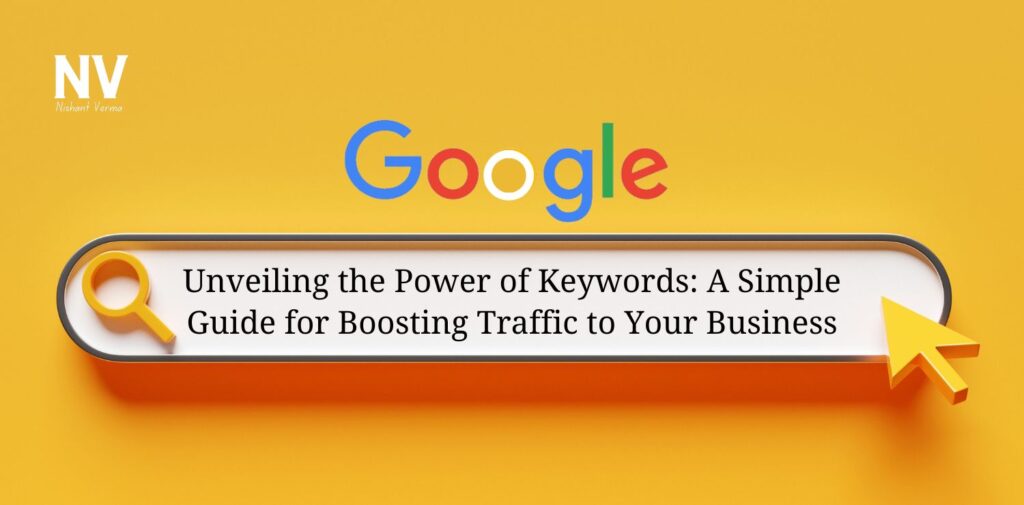In the vast digital landscape, the power of keywords acts as the compass guiding users to discover businesses, products, and services. Understanding the significance of keywords and strategically incorporating them into your online presence can significantly boost traffic to your business. This guide aims to demystify the world of keywords, breaking down the process in easy and simple language to help you unlock the potential of targeted online visibility.
The Power of Keywords in Online Visibility
- What Are Keywords?
Keywords are the words or phrases users type into search engines when looking for information. They are the bridge connecting your business to potential customers. - Why Are Keywords Important?
Keywords are the backbone of search engine optimization (SEO). When your website aligns with the relevant power of keywords, it becomes more visible to users searching for products or services related to your business. - How Keywords Impact Traffic
Understanding the right keywords can significantly impact the amount and quality of traffic directed to your website. Targeting the keywords your audience uses ensures your business appears in relevant search results.
Identifying Your Target Keywords
- Understanding Your Audience
To choose the right power of keywords, you need to understand your audience. What words or phrases would they use when searching for products or services similar to yours?

- Analyzing Your Products or Services
Examine your products or services closely. What are their unique features? What problems do they solve? These insights can help identify keywords that resonate with your offerings. - Researching Competitor Keywords
Look at what keywords your competitors are targeting. Analyzing competitor strategies can provide valuable insights and help you refine your approach.
Conducting Keyword Research
- Utilizing Keyword Research Tools
Several tools, such as Google Keyword Planner, Ubersuggest, and SEMrush, can assist in identifying relevant keywords. Explore these tools to discover search volumes and competition levels. - Short-Tail vs. Long-Tail Keywords
Short-tail keywords are brief and general, while long-tail keywords are more specific. Both play a role in your strategy, with long-tail keywords often offering a more targeted approach. - Geo-Targeted Keywords
If your business operates in specific locations, incorporate geo-targeted keywords. This ensures your business appears in local search results, attracting nearby customers.
On-Page Optimization with the power of keywords
- Optimizing Title Tags
Incorporate your target keywords into title tags. This is the first thing users see in search results and helps search engines understand the content of your pages. - Crafting Compelling Meta Descriptions
Write meta descriptions that not only include keywords but also entice users to click on your link. A well-crafted meta description can improve click-through rates. - Headers and Content Optimization
Integrate the power of keywords naturally into your content, including headers. However, prioritize providing valuable and relevant information to users over keyword stuffing.
Creating Quality Content Around Keywords

- Content Relevance
Craft content that aligns with your target keywords. Your content should be informative and engaging and fulfil the needs of users searching for those keywords. - Blogging for Keywords
Maintain a blog where you can consistently create content around your target keywords. Blog posts not only boost SEO but also establish your business as an authority in your industry. - Diversifying Content Formats
Explore different content formats, such as videos, infographics, and podcasts, to cater to diverse audience preferences. Incorporate keywords into these formats for broader visibility.
Off-Page Optimization and Backlinks
- Building Quality Backlinks
Quality backlinks from reputable websites can significantly boost your SEO. Collaborate with partners, participate in guest blogging, or create shareable content to earn backlinks. - Social Media Profiles and Keywords
Integrate keywords into your social media profiles and posts. Social signals can impact SEO, and using the power of keywords consistently across platforms reinforces your online presence. - Online Reviews and Local SEO
Encourage satisfied customers to leave reviews containing relevant keywords. Positive reviews not only build trust but also contribute to your local SEO efforts.
Monitoring and Adapting Your Keyword Strategy
- Google Analytics
Regularly monitor your website’s performance using tools like Google Analytics. Track keyword performance, user behaviour, and other relevant metrics to adapt your strategy. - Adjusting Based on Trends
Stay informed about industry trends and adjust your keyword strategy accordingly. Emerging keywords can present new opportunities for attracting traffic. - A/B Testing
Conduct A/B testing with different power of keywords and content approaches. Analyze the results to refine your strategy and focus on what resonates most with your audience.
Paid Advertising and Keyword Campaigns
- Google Ads
Explore Google Ads to run paid campaigns targeting specific keywords. This approach ensures your business appears prominently in search results for chosen keywords. - Social Media Advertising
Utilize social media advertising platforms that allow keyword targeting. Craft compelling ad copy that aligns with your target keywords for effective campaigns. - Budgeting and ROI Analysis
Establish a budget for paid advertising campaigns and regularly assess the return on investment (ROI). Adjust your strategy based on the performance of different keywords.
Common Mistakes to Avoid
- Keyword Stuffing
Avoid keyword stuffing, which involves overloading content with keywords in an unnatural way. This can harm your SEO and user experience. - Ignoring Analytics
Neglecting analytics is a common mistake. Regularly analyze data to understand the effectiveness of your keyword strategy and make informed decisions. - Neglecting Long-Tail Keywords
Don’t overlook the power of long-tail keywords. While they may have lower search volumes, they often attract more targeted and interested users.
Staying Up-to-Date with SEO Trends

- SEO Algorithm Changes
Search engine SEO algorithms evolve. Stay informed about changes to algorithms and adjust your strategy to align with the latest SEO trends. - Voice Search Optimization
With the rise of voice-activated devices, consider optimizing for voice search. Understand how users phrase spoken queries and adjust your keywords accordingly. - Mobile-Friendly SEO
Given the prevalence of mobile browsing, ensure your website is mobile-friendly. Mobile optimization is a key factor in search engine rankings.
Conclusion
As we conclude this guide, remember that the power of keywords is not just words; they are the keys to unlocking online visibility for your business. By identifying, optimizing, and strategically utilizing keywords, you can attract more targeted traffic and connect with the audience that matters most. Stay informed, adapt to changes, and enjoy the journey of elevating your business through the power of keywords. Here’s to increased visibility, enhanced traffic, and online success!




